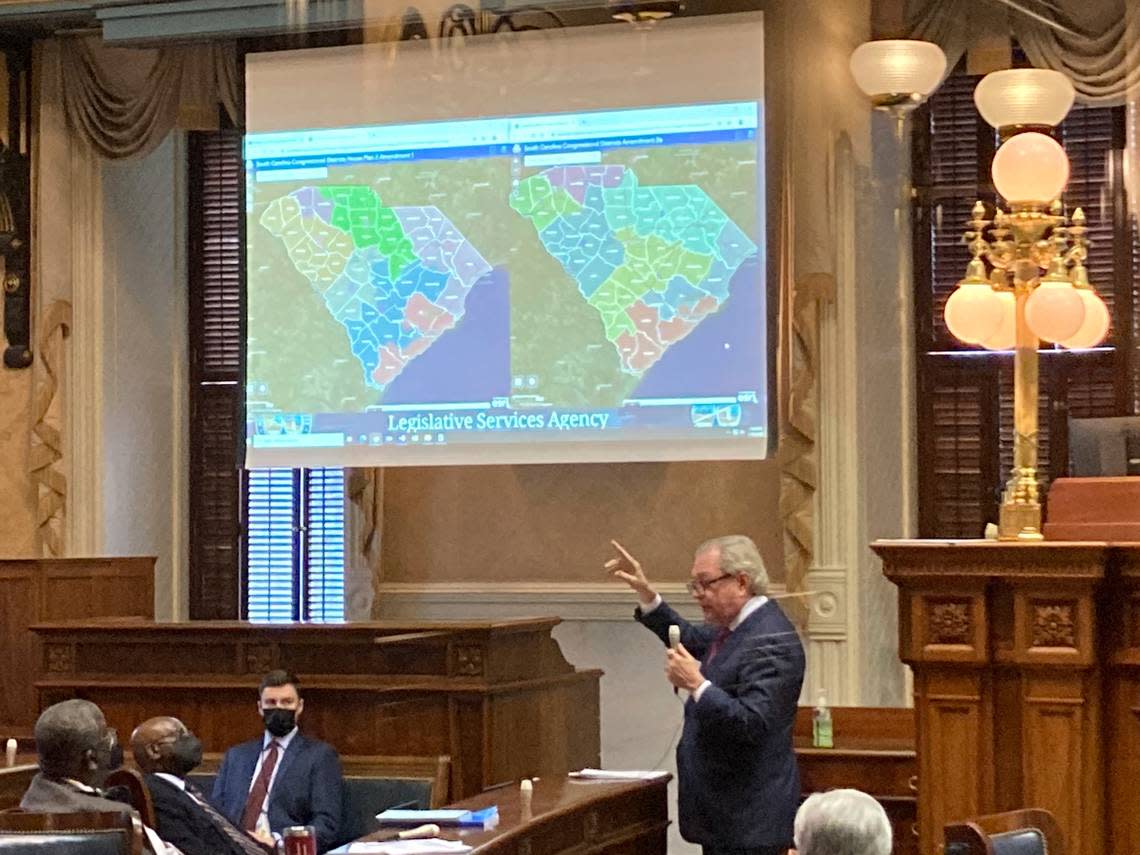SC’s 1st District must be redrawn after court rules it discriminates against Black voters

A portion of South Carolina’s congressional map unconstitutionally discriminates against Black voters and must be redrawn, a three-judge panel ruled Friday.
A panel of three U.S. District judges ruled the coastal 1st District, represented by Republican Nancy Mace, is an unlawful racial gerrymander that discriminates against Black voters in violation of the Equal Protection Clause of the 14th Amendment.
The court’s decision comes following a lawsuit the South Carolina NAACP filed last year asserting the 1st, 2nd and 5th congressional districts were racial gerrymanders drawn with discriminatory intent to dilute the voting strength of Black South Carolinians. A bench trial over the map was held late last year in Charleston federal court.
While the judicial panel found that race was the predominant factor motivating the General Assembly’s adoption of the 1st District map and that it was drawn with racially discriminatory intent, it did not find the 2nd and 5th districts were unconstitutional.
“While we had hoped for a more fulsome decision, we’re content to see that the voters in CD1 have had their constitutional rights reaffirmed,” said Antonio Ingram, a lawyer for the South Carolina NAACP.
The court has ordered the state to cease conducting elections in the 1st District until a constitutionally valid reapportionment plan has been approved. The next U.S. House election is set for November 2024.
The three-judge panel, composed of Mary Geiger Lewis, Richard Gergel and Toby Heytens, has ordered the General Assembly to submit a remedial redistricting proposal to the court before March 31.
Any revised proposal would likely involve changes to not just the 1st District, but also the neighboring 6th District, represented by Democratic Rep. Jim Clyburn and possibly others.
Ingram said in racial gerrymandering cases only districts identified as unconstitutional are typically redrawn, but that because the court found intentional discrimination in this case the entire map could be seen as “tainted” and in need of revision.
“I think any remedy, whether it’s holistic or just targeting CD1, will have ripple effects on adjoining districts, at the very least,” Ingram said.
Mace said Friday she looked forward to continuing to deliver results for her district, regardless of how it’s ultimately drawn.
“I will always work hard and serve as an independent voice for the Lowcountry,” she said in a statement.
It’s unclear at this point whether the Legislature will redraw the congressional map or appeal the case.
House Speaker Murrell Smith, R-Sumter, said Friday he disagreed with the District Court ruling and was evaluating next steps.
“I maintain that the House drew maps without racial bias and in the best interest of all the people of this state,” Smith said in a statement. “I have already been in touch with the House legal team and will evaluate our next steps. I would anticipate that we will seek to appeal this decision.”
Speaking at a news conference Friday, Gov. Henry McMaster downplayed the court ruling, but said he anticipated an appeal.
“We go through this about every time we have a census,” the governor said. “It goes back and forth and I’m sure it’ll be legally exhausted by the time it’s resolved. But we’ve got a lot of other things that we need to be focusing on.”
If the state appeals the decision, it would go directly to the U.S. Supreme Court. If the Supreme Court takes up an appeal, it would likely issue an opinion by June 2024, ahead of the next congressional elections, Ingram said.
Republicans argued politics, not race was motivation
The contested map was enacted last January and used in this past November’s midterms that saw Mace coast to a nearly 14-point victory over Democrat Annie Andrews.
Lawyers for South Carolina House and Senate leadership argued at trial that politics, not race, had driven line-drawing decisions. They stressed the importance Republican lawmakers placed on ensuring Mace, who won by just over a point in 2020, retained her seat.
“The Senate was not going to pass a plan that sacrificed the 1st,” Senate Majority Leader Shane Massey, R-Edgefield, testified at trial.
Republican lawmakers said they set out to draw a map that preserved district cores, repaired precinct splits and virtually guaranteed Republicans control of the 1st District. Race, however, was not a consideration, they testified.
Lawyers for the South Carolina NAACP argued the defendants’ explanations were post-hoc rationalizations. They relied on testimony from redistricting experts who statistically analyzed the maps and found them to be racially biased, even when controlling for political considerations.
“This was about racial preferences cloaked in partisanship,” Ingram said Friday. “It’s not just about Democrats and Republicans fighting, it’s about Black people being disenfranchised.”
Judge Gergel, in particular, appeared swayed by an analysis that showed a disproportionate number of Black voters in Charleston County had been moved from District 1 to District 6.
Prior to the new map, Black voters in Charleston County had been split roughly evenly between the 1st and 6th districts. After lawmakers wrapped up reapportionment early last year, 80% of Black voters in Charleston County resided in the 6th, a majority-minority district.
“The movement of over 30,000 African Americans in a single county from Congressional District No. 1 to Congressional District No. 6 created a stark racial gerrymander of Charleston County,” the judges wrote in their opinion, adding that in doing so the legislative mapmaker had “made a mockery of the traditional districting principle of constituent consistency.”
Reporter Joseph Bustos contributed.
